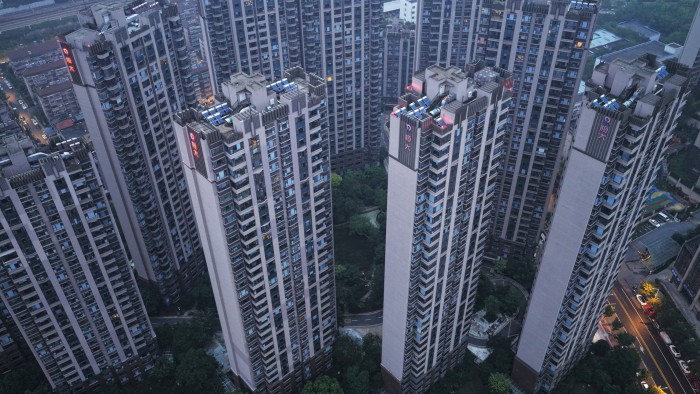Stay informed with free updates
Simply sign up to the Chinese economy myFT Digest — delivered directly to your inbox.
China’s investment declined last month by the most since the pandemic while housing prices fell faster than expected, underlining pressure on policymakers to maintain momentum in the world’s second-largest economy.
Fixed asset investment declined 1.7 per cent in the year to October compared with the same period a year earlier, its weakest reading since June 2020. The figure missed forecasts of a 0.8 per cent drop and was lower than a 0.5 per cent contraction to September.
New home prices, meanwhile, fell 0.45 per cent in October from the previous month, the most since October last year and greater than a 0.4 per cent decline in September, according to data released by China’s National Bureau of Statistics on Friday.
“China’s key activity indicators continued to slow across the board,” said Lynn Song, ING chief economist for greater China. He said that while the economy would still hit the government’s growth target for this year of about 5 per cent, “supportive policies will be necessary to achieve long-term goals”.
Industrial production rose 4.9 per cent from a year earlier, trailing a forecast of 5.5 per cent in an analyst poll by Reuters and 6.5 per cent growth in September. Retail sales in October expanded 2.9 per cent, better than a Reuters poll forecast of 2.8 per cent but down from 3 per cent the previous month. Both were the weakest readings since August 2024.
Fu Linghui, spokesperson of the National Bureau of Statistics, said that while the overall economy was operating “relatively smoothly”, with progress in developing new industries, there were “many unstable and uncertain factors in the external environment”.
“There is significant pressure to adjust domestic economic structure, which pose several challenges to maintaining stable economic operation,” Fu said.
China is grappling with what economists call a “two-speed” economy, with net exports and investment broadly holding up growth despite US President Donald Trump’s trade war, but the domestic economy suffering from weak demand and a prolonged bout of deflation.
Authorities announced a pivot to bolstering domestic demand more than a year ago, which has included easing monetary policy, issuing stimulus bonds and unveiling programmes to support households.
But those efforts have yet to significantly revitalise consumption, which has been hit by a years-long slowdown in the real estate market that has been weighing on household spending and consumer confidence.
ING’s Song said private sector investment fell 4.5 per cent year to date against the same period last year, while even government investment slowed to 0.1 during that time and looked “likely to tip into contraction territory next month”.
He said Beijing’s “anti-involution” push to curb aggressive price competition that economists say stems from industrial overcapacity and weak domestic demand “could be adding to the downward pressure”.
Weak credit data last month, with new renminbi loans declining, was another sign of corporate reluctance to invest, he said.
The NBS also said the year-to-date decline in property development investment deepened from 13.9 per cent to 14.7 year on year.
Yuhan Zhang, principal economist at the Conference Board said the data showed “ongoing weakness in housing investment and developer sentiment”.
“The second-hand market, in particular, reflects structural oversupply and weak consumer confidence,” he added in a report.
Zhang said China showed modest and uneven growth in fixed-asset investment in manufacturing, led by autos and transport equipment.
“We will continue to see policy-directed investment in infrastructure, advanced manufacturing, and industrial upgrading,” he said.
Additional contributions by Wenjie Ding in Beijing. Data visualisation by Haohsiang Ko in Hong Kong

